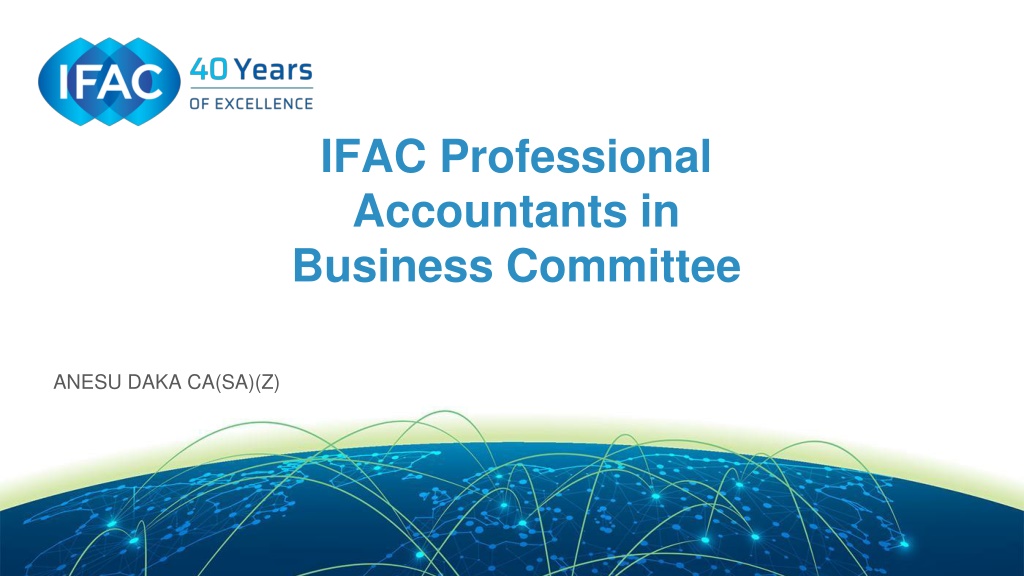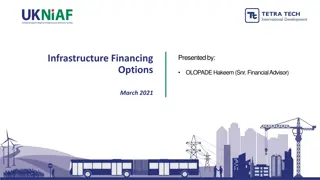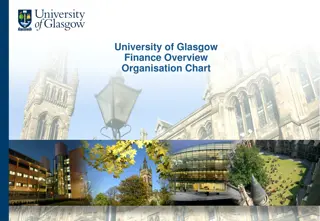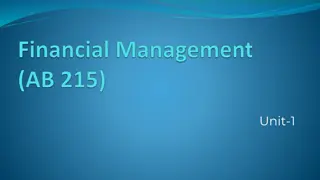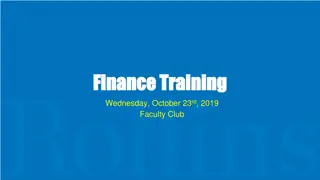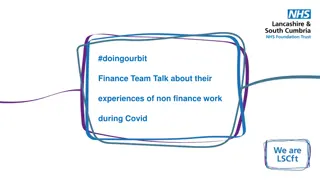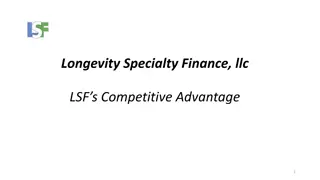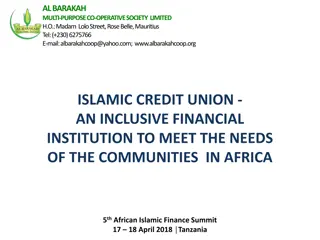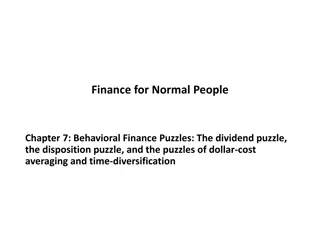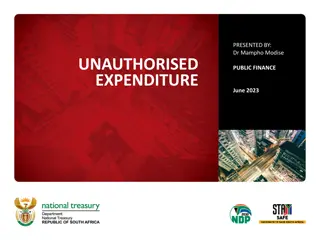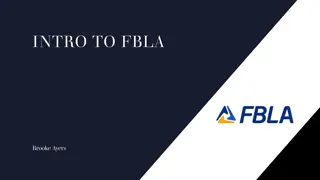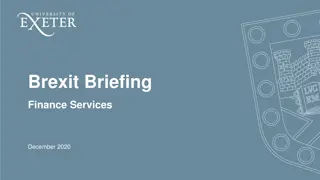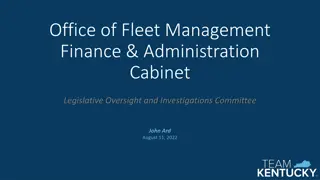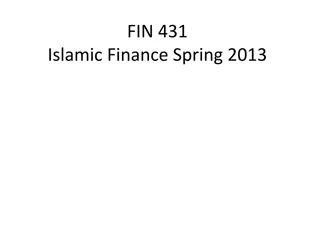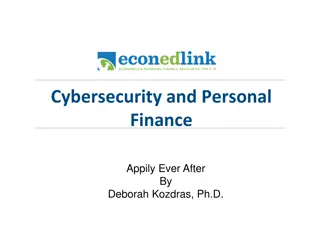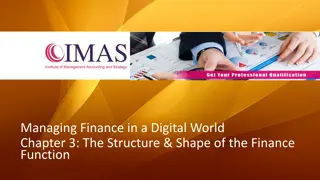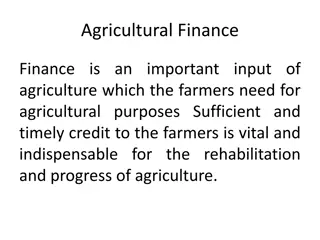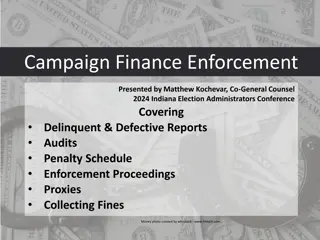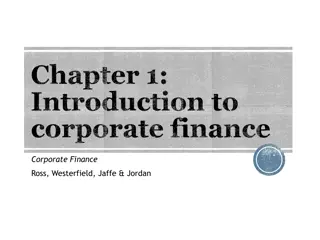Future Challenges and Opportunities for Finance Professionals
Explore the evolving landscape of finance professionals and functions as they navigate key challenges such as rapid technological advancements, changing employer expectations, and the need for transparency and ethical practices. Discover insights on staying relevant, adding value, and adapting to the demands of the modern financial world.
Download Presentation

Please find below an Image/Link to download the presentation.
The content on the website is provided AS IS for your information and personal use only. It may not be sold, licensed, or shared on other websites without obtaining consent from the author. Download presentation by click this link. If you encounter any issues during the download, it is possible that the publisher has removed the file from their server.
E N D
Presentation Transcript
IFAC Professional Accountants in Business Committee ANESU DAKA CA(SA)(Z)
Contents A Vision of the Finance Professional and the Finance Function Activities of the IFAC PAIB Committee PAO Self Evaluation Tool Priorities and Needs in relation to serving PAIBs Page 2
A Vision for the Finance Professional and the Finance Function Page 3 | IFAC Council Meeting 2017 | Brussels Belgium Page 3
CFOs and PAIBs Supporting the Business Supporting effective governance, compliance and control, and integrity Effective, trusted, proactive in leadership, navigating the business, and strategic and operational decision making Page 4
The Key Challenges Facing PAIBs Speed of change and keeping up-to-date Fulfilling employer expectations to balance stewardship/compliance and entrepreneurial roles Adding value to the wider organization Being transparent and ethical under pressure Fragmented career paths in finance and accounting Page 5
Future Proofing the Profession Tech driving massive change & challenging relevance Automation of roles Full visibility of transactions / real time self service reporting Competition for PAIB space e.g., data scientists Continuing lowering cost of F&A Managing & reporting for value Millennial expectations Page 6
The Road to Relevance: Accounting for the Business The financials only tell a small part of a performance story The accountant of today and tomorrow needs to provide information and analysis that supports decisions about all aspects of an organization s business model Page 7
The key elements of developing a vision for finance professionals and functions Customer perspective of the finance function, and key insights on opportunities and challenges Building awareness of the latest in digital and technology developments Future finance vision and development roadmap The finance professional profile of the future: Roles; and Knowledge, skills and competencies Page 8
The key elements of developing a vision for finance professionals and functions Customer perspective of the finance function, and key insights on opportunities and challenges Building awareness of the latest in digital and technology developments Future finance vision and development roadmap The finance professional profile of the future: Roles; and Knowledge, skills and competencies Page 9
Customer perspective of the finance function, and key insights on opportunities and challenges What do finance function customers want from the finance function? Page 10
The key elements of developing a vision for finance professionals and functions Customer perspective of the finance function, and key insights on opportunities and challenges Building awareness of the latest in digital and technology developments Future finance vision and development roadmap The finance professional profile of the future: Roles; and Knowledge, skills and competencies Page 11
Building Awareness of the Latest in Digital and Technology Developments What can we do now? Look for quick wins , efficiencies in the way processes are performed Refresh the team s profile need people who understand the opportunities and risks from digital Recruit team members who are interested in doing things differently Need good project managers The changing role of the CFO Accelerated planning cycles Key trends impacting the finance function Demand for advanced analytics New technologies Page 12
Building Awareness of the Latest in Digital and Technology Developments Agile Finance Function Responsive, Insightful, Efficient Talent Next generation of enterprise resource planning (ERP) Key management and organization design Does digital lead to new value? Challenges Enablers If digital finance changes everything, how do we enable our people? Do we still need local finance if global transparency is possible? Big data and advanced analytics Cloud and software-as-a- service (SaaS) Internet of Things (IoT) Intelligent automation Traditional RPA Cognitive RPA Intelligent chatbots Artificial intelligence Timing and value - separating sustainable solutions from temporary hypes. When to invest in new tech and when not? Blockchain and distributed Ledgers Does digital lead to empty offices? Page 13
Building Awareness of the Latest in Digital and Technology Developments Automation gaining momentum Robotic Process Automation (RPA) does not solve failing processes Need to be clear on tasks you automate and those you don t Build RPA skills in the team (does not require deep technical programming expertise) In assessing benefits, cost reduction is only one measure; benefits of releasing time for finance staff is key RPA needs to be part of a wider digital finance function vision that can be scaled and clearly connects to other technologies and applications Effective engagement with IT and outsourcing and BPO providers is important Page 14
Building Awareness of the Latest in Digital and Technology Developments - Blockchain What is Blockchain? Uses for Blockchain Healthcare Media Manufacturing, power and utilities Public Sector Financial Services Where is it useful? To solve data fragmentation Where there are multiple parties eliminates reconciliations To provide a complete audit trail Good opportunity to consider when a big system is coming to the end of its useful life Challenges Legal and regulatory concerns Security concerns Data privacy concerns Scalability concerns Uncertainty around cost of implementation Loss of keys (loss of data control) Software, both a database and a network Distributed ledger with no central authority Find out more: Use case: Wine industry to verify authenticity of wine see video Page 15
The key elements of developing a vision for finance professionals and functions Customer perspective of the finance function, and key insights on opportunities and challenges Building awareness of the latest in digital and technology developments Future finance vision and development roadmap The finance professional profile of the future: Roles; and Knowledge, skills and competencies Page 16
Future Finance Vision and Roadmap A vision to help deal with and respond to uncertainty, with acknowledgement that the end state is unknown Placing Crowd-sourcing, virtual workshops and digital demos. Live exploration of digital technologies and ways of working (organizational) strategy, customer needs and experience at the heart of design. Rapid proto-typing, experimentation, timely acceptance of failing and need for continual reiteration Ability to quickly scale areas of good practice. The future is so uncertain that looking too far ahead is unhelpful Page 17
The key elements of developing a vision for finance professionals and functions Customer perspective of the finance function, and key insights on opportunities and challenges Building awareness of the latest in digital and technology developments Future finance vision and development roadmap The finance professional profile of the future: Roles; and Knowledge, skills and competencies Page 18
The Professional Accountant Profile and Roles that will Lead to Relevance Germination areas: Conservation areas: Story teller Trusted Professional Technology and digital enabler Analyst Growth areas: Creative destruction: Co-pilot Navigator Transaction and process expert Brand protector Influencer Page 19
Knowledge, skills and competencies professional accountants require to embrace roles Ways to acquire relevant knowledge, skills and competency: Formal and structured Business and sector- specific PAO qualification, additional education and CPD Lifelong learning Technical On the job, secondments/job rotations, onsite training, shadowing, experiential training, and learning by doing in a supportive environment Social and community Interpersonal & behavioral Mentoring/coaching (role models and reverse mentoring, 360 performance feedback, and volunteer roles (e.g. board member of treasurer of an external organization) Page 20
A Vision for the Finance Professional and the Finance Function For further insight, the IFAC PAIB Committee meeting summary report is available here: https://www.ifac.org/publications- resources/vision-finance-professional-and-finance-function To ensure we are providing information that is easy to consume and useful to your needs, we welcome your feedback. Comments can be submitted here: https://www.surveygizmo.com/s3/435442 6/PAIBC-Meeting-Report Page 21
Activities of the IFAC PAIB Committee Page 22 | IFAC Council Meeting 2017 | Brussels Belgium Page 22
IFAC PAIB Committee Purpose Apply IFAC s unique global, influential and trusted position to enhance the relevance and value of PAIBs and their professional bodies by Raising awareness of the value of PAIBs and PAIB issues Supporting a PAIB relevant profession Knowledge development and sharing Provide input into IFAC and others on public policies, standards and initiatives relevant to PAIBs Page 23
What is the PAIB Committees modus operandi? The Committee approach convenes PAIBs and their PAOs to identify & debate key issues, opportunities & challenges Focus on meetings & forums that facilitate high quality interaction, engagement and collaboration An innovation space for PAOs and others to come together and innovate on PAIB issues Continual review to ensure effective and efficiency of working and quality of outcomes Page 24
How does the PAIB Committee Lead & Support the Profession? Communicate across the profession via meeting reports Thought leadership Advocate and represent PAIBs and PAIB issues Support development of PAO/RO support tools and resources Provide input into IFAC Board/leadership, Public Policy and Regulatory Advisory Group, Technology Advisory Group, and standard-setting boards e.g., ethics and audit quality Page 25
PAIB Focus Topic Focus Areas Enterprise Performance Management Integrated Thinking and Reporting Audit Quality and Audit Committee Effectiveness Effective Risk Management Technology Finance Function Vision and Roadmap Future PAIB Profile Finance & accounting expert Business partner Value enabler ALL UNDERPINNED BY PROFESSIONAL ETHICS AND VALUES Page 26
Trust and Accountability Education Professional skepticism and judgement Experience beyond only public practice Examination PAIBs are the first line of defense Ethics business control and safeguarding the reputation of an organization Providing Enforcement Page 27
PAIB Self-Assessment Evaluation Tool for PAOs Page 28 | IFAC Council Meeting 2017 | Brussels Belgium Page 28
PAIB Self-Assessment Evaluation Tool for PAOs Developed to help: Take a strategic and practical approach to enhancing relevance for PAIBs PAOs identify where to develop capacity that can lead to growth in activities and services valued by members working in business Download pdf tool here: https://www.ifac.org/publications- resources/supporting-accountants-business Excel version also available to download here Feedback welcomed. Please contact Stathis Gould stathisgould@ifac.org with any suggestions Page 29
PAIB Self-Assessment Evaluation Tool for PAOs A series of questions cover four (4) key enablers for PAOs to more effectively enhance service delivery for their PAIB membership: Governance and strategy (8 questions) Capacity and people (6 questions) Knowledge and education (5 questions) Member and stakeholder engagement (5 questions) Page 30
Action Tracker Page 31
Priorities and Needs in relation to serving PAIBs Page 32 | IFAC Council Meeting 2017 | Brussels Belgium Page 32
The Opportunities for the Profession in Supporting PAIBs PAIB status and recognition Increase membership and influence of PAOs Enhanced: Certification and training programs, lifelong learning Advocacy on behalf of PAIBs and PAIB issues Share and collaborate among PAOs, regional body and IFAC on a wide range of issues Page 33
Challenges for PAOs in Supporting PAIBs Common challenges for PAOs include: Legal/regulatory constraints to PAIB membership Difficulty in responding to diverse needs Little experience of engaging accountants in business in some jurisdictions Lack of PAIB representation in PAO governance Are any of these issues for ICAM? What are ICAM s priorities and needs in relation to PAIBs? Page 34
Equipping PAOs and their members Guidance Toolkits Global Knowledge Gateway PAIBC Meeting reports Page 35
Follow us! @InternationalFederation OfAccountants International Federation of Accountants @IFAC ifacpresident www.ifac.org
